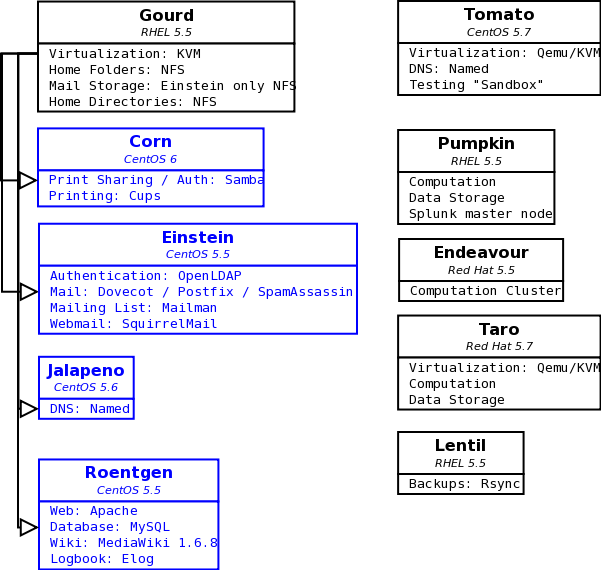Difference between revisions of "NPG Layout"
m (Our Layout moved to NPG Layout) |
|||
| (30 intermediate revisions by 2 users not shown) | |||
| Line 1: | Line 1: | ||
| − | + | This page provides some diagrams and information about how our server systems and [[VMWare|virtual machines]] are organized. For detailed information about our network layout, see the [[Network|network]] page. | |
| − | + | ||
| + | = Systems Diagram = | ||
Here is a diagram of our current system layout. | Here is a diagram of our current system layout. | ||
| + | |||
| + | [[Image:System layout current.png]] | ||
'''Black''' Systems represent physical hardware. | '''Black''' Systems represent physical hardware. | ||
| Line 10: | Line 13: | ||
'''Arrows''' indicate which system a Virtual Machine is running on. Other hosts with VMWare capability can be used to fill in for the main Virtualization server during downtime. | '''Arrows''' indicate which system a Virtual Machine is running on. Other hosts with VMWare capability can be used to fill in for the main Virtualization server during downtime. | ||
| − | ''' | + | '''Operating System''' is listed in italics beneath each system's name |
| − | |||
| − | |||
| − | |||
| − | |||
| − | |||
| − | |||
| − | |||
| − | |||
| − | |||
| − | |||
| − | |||
| − | |||
| − | |||
| − | |||
| − | |||
| − | |||
| − | |||
| − | |||
| − | |||
| − | + | '''Services''' are listed in the second row of the diagram, followed by the name of the software used to provide that service. | |
| − | + | =System Descriptions= | |
| − | + | Brief descriptions of our computing systems. For more detailed information see the [[Servers_and_Workstations|servers and workstations]] page. | |
| − | == | + | ==Server Hardware== |
| − | + | '''[[Endeavour]]''' is a 26-node beowulf cluster. | |
| + | '''[[Gourd]]''' is a 2U rackmount server from [http://www.microway.com/ Microway] with two Quad-Core AMD Opteron processors and 32 GB of memory. It is the workhorse of the NPG server farm, hosting user's home folders as well as acting as the primary host for [[kvm]] virtual machines. | ||
| − | [[ | + | '''[[Lentil]]''' is our backup server, and it is a custom built Dual-Core Pentium D machine with 2 GB of memory. |
| − | + | '''[[Pumpkin]]''' is a Microway 5U rackmount server with four Dual-Core AMD Opteron processors and 32 GB of memory. It is used primarily for data storage and computation. | |
| − | + | '''[[Taro]]''' is a computation and data storage server with two Quad-Core Intel Xenon processors and 24 GB of memory. It also serves as a secondary host for virtual machines. | |
| − | + | '''[[Tomato]]''' was previously Einstein, and now is a secondary [[DNS]] server and [[kvm]] host. | |
| − | |||
| − | |||
| − | |||
| − | |||
| − | |||
| − | |||
| − | |||
| − | |||
| − | |||
| − | |||
Latest revision as of 15:57, 15 August 2013
This page provides some diagrams and information about how our server systems and virtual machines are organized. For detailed information about our network layout, see the network page.
Systems Diagram
Here is a diagram of our current system layout.
Black Systems represent physical hardware.
Blue Systems represent Virtual Machines
Arrows indicate which system a Virtual Machine is running on. Other hosts with VMWare capability can be used to fill in for the main Virtualization server during downtime.
Operating System is listed in italics beneath each system's name
Services are listed in the second row of the diagram, followed by the name of the software used to provide that service.
System Descriptions
Brief descriptions of our computing systems. For more detailed information see the servers and workstations page.
Server Hardware
Endeavour is a 26-node beowulf cluster.
Gourd is a 2U rackmount server from Microway with two Quad-Core AMD Opteron processors and 32 GB of memory. It is the workhorse of the NPG server farm, hosting user's home folders as well as acting as the primary host for kvm virtual machines.
Lentil is our backup server, and it is a custom built Dual-Core Pentium D machine with 2 GB of memory.
Pumpkin is a Microway 5U rackmount server with four Dual-Core AMD Opteron processors and 32 GB of memory. It is used primarily for data storage and computation.
Taro is a computation and data storage server with two Quad-Core Intel Xenon processors and 24 GB of memory. It also serves as a secondary host for virtual machines.
Tomato was previously Einstein, and now is a secondary DNS server and kvm host.
